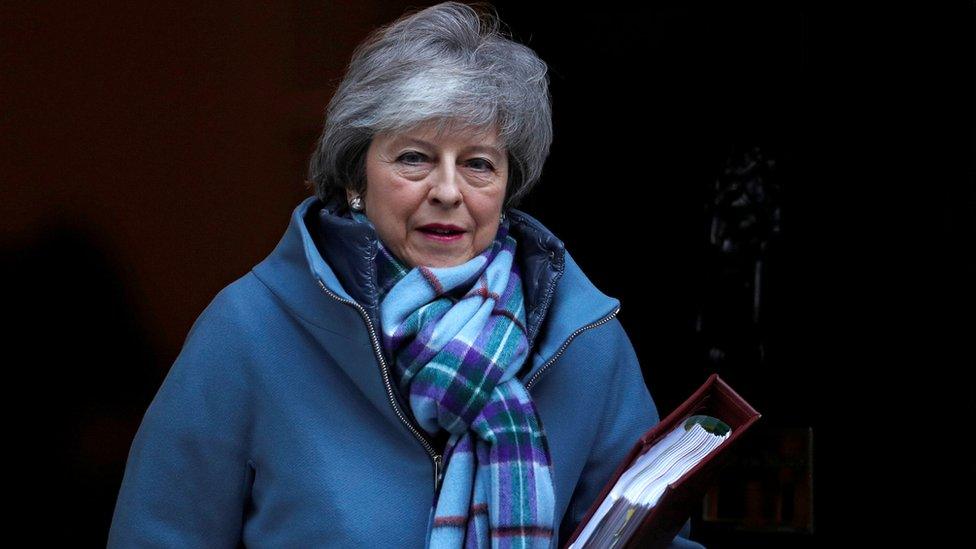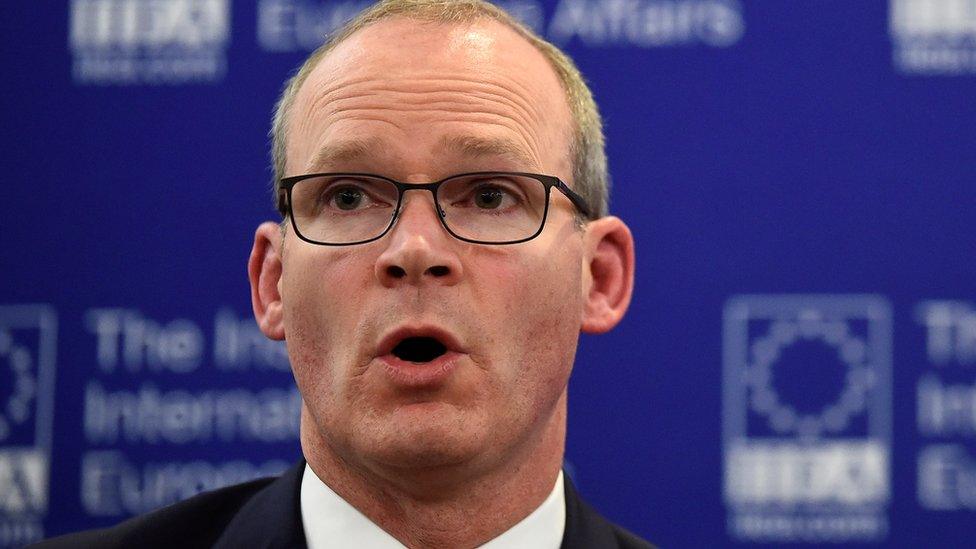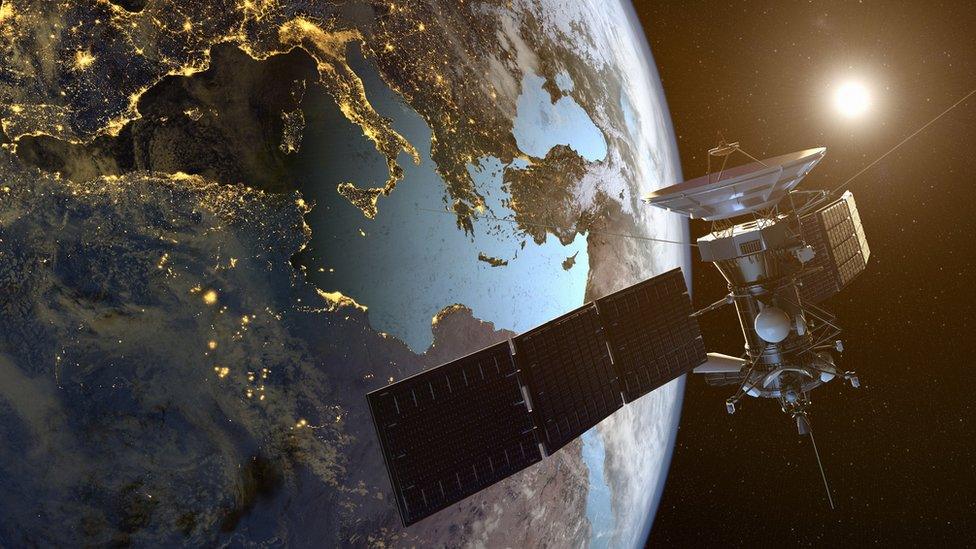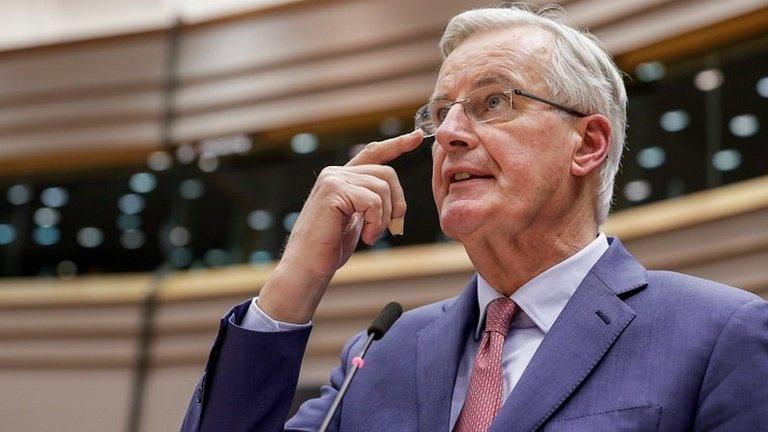Brexit: Theresa May 'determined' to leave EU in March
- Published

Theresa May said she would return to Brussels with a "renewed determination"
Theresa May has said she is "determined" to deliver Brexit on time, ahead of talks on the Irish backstop.
Writing in the Sunday Telegraph, the prime minister, external said she would return to Brussels with a "fresh mandate, new ideas and a renewed determination".
MPs have voted to seek an "alternative arrangement" to guarantee the Northern Ireland border stays open after Brexit.
But the Irish deputy prime minister has said "there are no credible alternative arrangements" to the proposal.
The backstop forms part of the withdrawal agreement negotiated by the UK and EU and is aimed at keeping the border between Northern Ireland and the Irish Republic open after Brexit.
BBC political correspondent Chris Mason said that while Mrs May pledged to "go back to Brussels to secure a plan that Parliament can stand behind", the EU remains publicly opposed to changing the backstop.
The UK is due to leave the EU at 23:00 GMT on Friday 29 March, when the two-year time limit on withdrawal negotiations enforced by the Article 50 process expires.
Some MPs have suggested Britain will need more time to negotiate its exit to avoid crashing out of the EU without a deal.
What has the prime minister said?
Mrs May has insisted the departure date will not change, writing in the Telegraph that she would "deliver Brexit on time".
And she said she rejected the suggestion "that seeking alternative arrangements for the backstop constituted 'ripping up the Good Friday Agreement'".
The prime minister added that MPs wanted the government to go back to Brussels to renegotiate the deal after the Commons voted in favour of Tory backbencher Sir Graham Brady's amendment on Tuesday that called for "alternative arrangements" to be found.
Mrs May wrote: "While replacing the backstop with alternative arrangements was one option, [Sir Graham] would also be happy with the current backstop if there was a time limit or unilateral exit mechanism."
What do cabinet ministers say?
Sajid Javid: Alternative Brexit backstop "can be done"
Home Secretary Sajid Javid told the BBC's Andrew Marr Show that an alternative arrangement to the Irish backstop "can be done" using "existing technology".
Mr Javid said: "I asked Border Force months ago to advise me to look at what alternative arrangements are possible and they've shown me quite clearly you can have no hard border on the island of Ireland and you can use existing technology - that is perfectly possible.
"The only thing that's missing is a bit of good will on the EU side."
And International Trade Secretary Liam Fox said it was "irresponsible" for the EU and the Irish Republic to say they will not discuss changing the backstop in the withdrawal agreement.
He told Sky's Sophy Ridge on Sunday: "For the Irish it's even more important than for most to talk to us for alternative ways of achieving a no hard border."
He said a no-deal Brexit would have an impact on the EU's economy, saying: "Are they really saying they'd rather be in a no deal position? It's not a responsible position to take."
Mr Fox said Article 50 - the mechanism by which the UK is leaving the EU - should only be extended in the event there was a Brexit deal that needed "a little time to get the legislation through".
To "simply extend" it, without a deal in place, would not "provide the impetus for a deal", he said.
Chief Secretary to the Treasury Liz Truss told John Pienaar on Pienaar's Politics that she was confident a time-limited backstop could be negotiated.
"On the time limit to the backstop there are various people across the EU who have hinted that that could be acceptable," she said.
"The fact is the EU have always claimed that the backstop is a temporary measure."
She added: "I think we are seeing signs of the EU's position softening."
What is the backstop?
By Tom Edgington, BBC Reality Check
Confused by Brexit jargon? Reality Check unpacks the basics.
The backstop is an "insurance policy" - designed to avoid a hard border "under all circumstances" between Northern Ireland and the Irish Republic.
Under the current Brexit deal, the 310-mile Irish border would become the only land border between the EU and the UK.
This would probably mean checks on goods crossing it, unless both sides could reach a comprehensive trade deal.
If such an agreement could not be reached, then to avoid those checks and border posts or other infrastructure, the backstop would come into force.
It would keep the UK in a "single customs territory" with the EU and leave Northern Ireland effectively in the EU's single market for goods.
A number of MPs fear the UK could be "trapped" in this arrangement for years, leaving it unable to strike its own trade deals on goods with the rest of the world.
What has the reaction been?
Writing in the Sunday Times, deputy Irish prime minister Simon Coveney, external said: "The EU will not renegotiate the withdrawal agreement and there will be no withdrawal agreement without the backstop."
Mr Coveney said the backstop was required to "ensure the protection of the Good Friday Agreement" which ended 30 years of armed struggle in Northern Ireland.

Simon Coveney said the backstop in the event of a no-deal Brexit was a "necessary guarantee" to ensure there was no hard border
He said no alternatives have been put forward "that achieve the shared goal of the UK and EU to avoid a hard border", and the backstop was a "necessary guarantee".
Arlene Foster - leader of the DUP, the party that props up Mrs May's government - said dealing with the "toxicity" of the backstop would allow the EU and UK to move forward towards a Brexit deal.
She said she was hopeful of finding alternatives but it depended on the "willingness" of the Irish government.
Speaking on BBC Radio Ulster's Sunday News programme, Mrs Foster said that if the EU wants a deal, it has to be acceptable to both sides.
"I think we really need to focus on trying to get a deal. That's what the DUP want, that's what the government wants and I believe it's what the European Union wants."
Sinn Féin vice-president Michelle O'Neill said the backstop was "the bottom line".
She told the BBC's Sunday Politics "nothing good" would come from Brexit.
Earlier on Sunday, the Sinn Féin president Mary Lou McDonald said the backstop was "the absolute bare minimum" required.
What do backbench MPs say?
Meanwhile, some Conservative backbench MPs, including senior Tory Brexiteer Steve Baker, have said they still have other issues with the Brexit deal.
Mr Baker, deputy chairman of the Eurosceptic group the European Research Group (ERG), warned there was "trouble ahead" for the prime minister.
In response to Mrs May's article, he tweeted, external: "Leave-backing MPs voted to support alternative arrangements in NI but with grave misgivings about the whole agreement.
"Now the PM co-opts us into accepting everything but the backstop and, on the backstop, accepting a codicil."
He said a "further substantial defeat" for the agreement should be expected "if all we see is a codicil - a 'joint interpretive instrument'".
Tory MP Andrea Jenkyns tweeted, external that the UK "deserves a better deal".
"No PM, we said we would support the amendment to send a message to EU re the backstop, we all said there are other issues with WA (withdrawal agreement)," she said.
In January, MPs rejected Mrs May's withdrawal agreement by 432 votes to 202, with nearly 120 Conservative MPs voting against their leader.
What has the EU said?
After the Commons voted on the Brady amendment, the EU's chief negotiator Michel Barnier said the backstop is "part and parcel" of the UK's Brexit deal and will not be renegotiated.
Speaking at the European Parliament last week, Mr Barnier said the backstop was a "realistic solution" to preventing a hard border.
- Published2 February 2019

- Published1 February 2019

- Published30 January 2019

